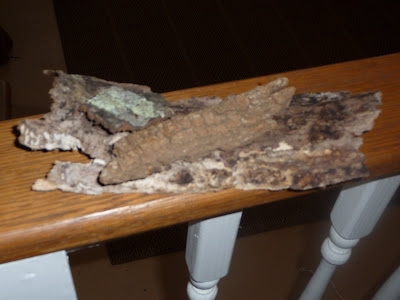
Yesterday over a coffee with the always inspirational
Nicholas Bate we got to talking somehow of pencils. I had always thought that there was some magical process by which the lead was inserted through the wooden tunnel, but apparently this isn't so. Pah. What else did my siblings tell me that I still believe? The joys of being the youngest child. We always used to drive past a wood of what I thought were pencil trees too - I can remember imagining each trunk as a giant pencil but I guess that wasn't the case either.
Anyway, Nicholas told me there was a book just about the pencil (there is too, I've found it
here), but last night reading
Wildwood, Roger Deakin's journey through trees, I came across these passages:
Now and again you discover the perfect pen and carry it everywhere until one day you lose it. But nothing is so universally dependable, or comes so naturally to hand as a pencil. What could be simpler? For much of my life, I have lived with one behind my ear, either to mark out saw cuts or mortices for carpentry or to scribble marginalia or underlines when reading. I often write with a pencil. It suits my tentative nature. It allows me literally to sketch out ideas before proceeding to the greater definition of ink. It was the first tool I used to write or to draw, and still suggests the close relationship between the two activities. I know I shall never outgrow pencils. it is comforting and liberating to know that you can always rub out what is pencilled. it is the other end of the spectrum from carving in stone. The pencil whispers across the page and is never dogmatic.
For all the same reason, I like a soft pencil better than a hard one. It is gentler on the paper, as a soft voice is easier on the ear. Its low definition draws in the reader's eye, which must sometimes peer through the graphite mist of a smudge where the page of an old notebook has been thumbed. Rub your finger long enough on a soft-pencilled phrase and it will evaporate into a pale-grey cloud. In this way a pencil is close to watercolour painting.
A pencil is an intimate, elemental conjunction of graphite and wood, like a grey-marrowed bone. The graphite is mined from deep inside a Cumbrian hillside in Borrowdale, eight miles south of Keswick. Fired in a kiln to 1000C to make the slender pencil cores, ranging in hardness from H to 9H and in softness from B to 9B, it is laid in a groove in one of the split halves of the wooden casing which are then glued together invisibly, clasping the lead tightly. But examine the cross-section of grain at one end, and you will notice it runs two different ways. In Tasmania there are trees they call pencil pines, but only because of the way they look. The fine grained, slow-grown mother of all pencils is incense cedar fromthe forests of Oregon, where a single tree may grown 140 feet high, with a trunk five feet across, enough cedar wood to make 150,000 pencils. it is the incense cedar that infuses pencils with the nutty aroma I remember as I opened my pencil-box. In a scooped-out hollow in my Oregon pine work table in front of me lies a smooth round pebble from the Hebrides. It sits snugly in the wood, like the pencil between finger and thumb, and like the hidden vein of graphite, poised inside the cedar to spin itself into words like gossamer from the spider.
Is it just me, or do you have the intense urge to visit that Borrowdale mine too now? Or at least to go and sniff a pencil?
I get asked a lot about how much work this blog is to maintain, but the truth is that I do it mainly for me. And this extract above illustrates that nicely - in the future I'll know exactly where I put that bit about pencils, unlike my actual pencils. Somehow I can never find one when I want to jot something down - and this is despite having THREE pencil cases (including a snazzy Moomin one Santa got me).
























